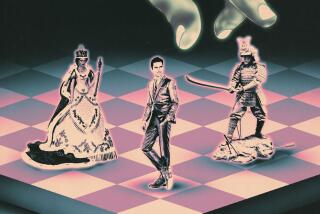FICTION
- Share via
FOOLS, KNAVES AND HEROES: Great Political Short Stories, edited and introduced by Jeffrey Archer and Simon Bainbridge (W. W. Norton: $19.95 ; 256 pp.) . Some of these 10 stories are so famous that it hardly seems worthwhile to anthologize them again: Mark Twain’s “The Man That Corrupted Hadleyburg,” James Joyce’s “Ivy Day in the Committee Room” and James Thurber’s “The Greatest Man in the World” (in which government officials muzzle and finally murder an aeronaut who fails to live up to the Lindbergh image).
No, the interest here lies in lesser-known tales: young Dickens spoofing an election for beadle in the 1830s, Saki imagining what would happen if angels became members of Parliament, co-editor and thriller writer Jeffrey Archer describing how the chiefs of rival Brazilian construction empires form an unlikely bond in the middle of an African coup.
Three stories in particular stand out. Two of them prove their fictional worth by the very outdatedness of their politics: Jack London’s “The Dream of Debs,” a San Francisco capitalist’s horrified account of a general strike; and Kingsley Amis’ “I Spy Strangers,” in which a mock Parliament staged by British troops at the end of World War II reveals the discontent that propelled the Labour Party to victory over Winston Churchill in 1945.
The third, Rudyard Kipling’s “The Village That Voted the Earth Was Flat,” is a wickedly funny and startlingly modern story--written in 1913--about auto speed traps, media manipulation, mass hysteria and the political uses of show biz.
Is there a unifying theme? Archer and Simon Bainbridge identify one--that “politicians (are) self-seekers and the world in which they move (is) a breeding-ground of corruption”--and then promptly dismiss it. Most writers, they say, “have not chosen to lead a public life” and are prey to a “fear of the unknown. . . . Their suspicion of politicians has no more force than the politicians’ view of all writers as subversives.”
More to Read
Sign up for our Book Club newsletter
Get the latest news, events and more from the Los Angeles Times Book Club, and help us get L.A. reading and talking.
You may occasionally receive promotional content from the Los Angeles Times.










